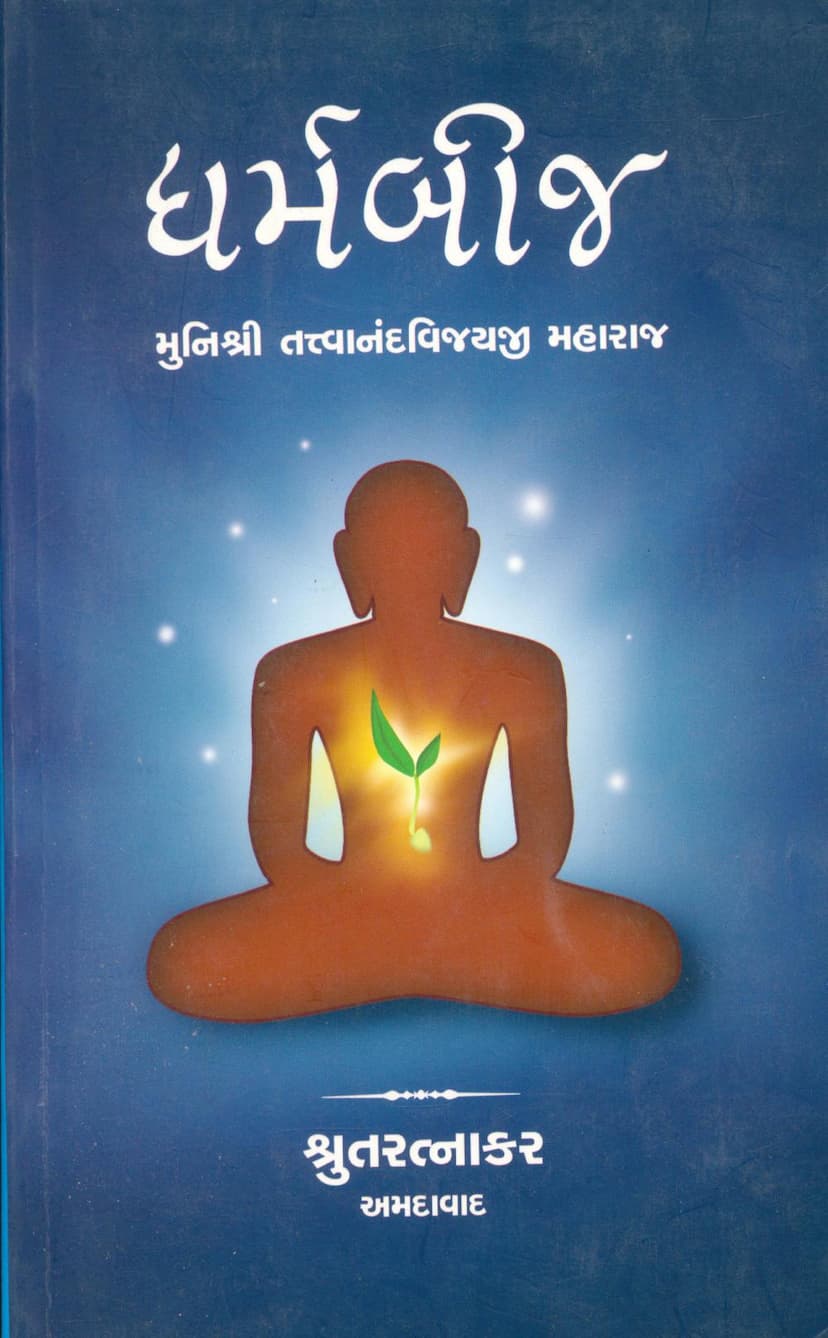Dharmbij
Added to library: September 1, 2025

Summary
Here is a comprehensive summary of the Jain text "Dharmbij" by Muni Shri Tattvanandvijayji Maharaj, based on the provided pages:
Book Title: Dharmbij (The Seed of Dharma) Author: Muni Shri Tattvanandvijayji Maharaj Publisher: Shrutratnakar, Ahmedabad Theme: The book focuses on the four fundamental spiritual attitudes or sentiments (Bhavanas) in Jainism: Maitri (Friendship/Love), Pramod (Joy/Appreciation), Karuna (Compassion), and Madhyastha (Equanimity/Impartiality). These are presented as the "seeds of Dharma" necessary for spiritual growth.
Core Concepts:
-
The Four Bhavanas as the Foundation of Dharma: The book emphasizes that Maitri, Pramod, Karuna, and Madhyastha are the foundational pillars of righteous conduct and spiritual progress. Just as a tree cannot exist without its seed, Dharma cannot flourish without these four Bhavanas. They are the seeds that, when nurtured, lead to the tree of Dharma, ultimately guiding the soul towards the state of Vitarag (liberation).
-
Maitri Bhavana (Friendship/Universal Love):
- Definition: Maitri is defined as contemplating the welfare of all beings. It involves viewing the entire world and every creature within it as a friend.
- Importance: It is considered the first and most crucial step in spiritual practice. Without Maitri towards even one being, true "friend-like sight" is not achieved. It helps in conquering anger, bringing peace, and is the basis of Ahimsa (non-violence). The lack of Maitri is seen as the root cause of conflict, terrorism, and mental/physical ailments in the world.
- Aspects: It has positive (vidheyatmak) aspects like wishing well for all, and negative (nishdhatmak) aspects like refraining from causing any harm through mind, speech, or body.
- Key Teachings: "May no creature commit any sin, may no creature suffer, may all beings be liberated from karma." (Quoting Yogashastra). It is also emphasized that Maitri fosters forgiveness, humility, contentment, and inner peace. It is the essence of Jain teachings and a vital component for attaining spiritual progress and ultimately, liberation.
-
Pramod Bhavana (Joy/Appreciation of Virtues):
- Definition: Pramod is the inner joy and admiration experienced when observing or hearing about the virtues and good qualities of others, especially virtuous individuals and spiritual guides.
- Importance: It counteracts envy and jealousy. Appreciating the qualities of others leads to the development of one's own virtues. It is described as a way to honor virtues and is considered an excellent practice that purifies the mind and leads to inner happiness.
- Key Teachings: The book quotes, "By singing the praises of the virtuous, virtues are acquired." Pramod encourages looking for the good in others, even in the face of their shortcomings. It is essential for spiritual growth and leads to a happy and contented state of mind.
-
Karuna Bhavana (Compassion):
- Definition: Karuna is the feeling of deep empathy for the suffering of others and the desire to alleviate their pain. It is closely linked to Ahimsa (non-violence) and is described as extending compassion to the distressed, the afflicted, and the fearful.
- Importance: Compassion strengthens the bond of Maitri. It helps in overcoming internal suffering and leads to the acquisition of merit. It is seen as an essential ingredient for spiritual purification.
- Aspects: It can be directed towards those suffering from physical ailments, mental distress, ignorance, or those caught in cycles of harmful actions. The book stresses that genuine compassion involves not just feeling sorry, but actively seeking to help and alleviate suffering, even at personal cost. It also highlights the Jain principle of non-violence (Ahimsa) as the core of Karuna, advocating for the protection of all living beings.
-
Madhyastha Bhavana (Equanimity/Impartiality):
- Definition: Madhyastha is maintaining a state of inner balance and impartiality towards all beings, especially those who are wicked, stubborn, or engage in harmful actions. It means remaining undisturbed by the actions or states of others, without being swayed by attachment (Raga) or aversion (Dvesha).
- Importance: It is the central pillar that holds the other three Bhavanas together. It helps in cultivating inner peace and freedom from mental agitation. By observing the nature of Karma and its effects on beings, one develops equanimity.
- Aspects: It involves understanding that beings act according to their karma. It also applies to worldly pleasures and pains, encouraging detachment from them. It means not developing hatred towards sinners, but maintaining a neutral stance while still wishing for their eventual well-being through spiritual progress. The ultimate form of Madhyastha is attained through self-realization and understanding the interconnectedness of all souls.
-
Purity, Joy, and Reverence (Pavitrata, Anand, Pujyata): The Bhavanas are also linked to attaining purity of heart, experiencing inner joy, and becoming worthy of reverence. Maitri leads to purity, Pramod to joy, and Karuna and Madhyastha contribute to being revered.
-
Practical Application: The book provides practical guidance, including daily contemplation, making resolutions, tracking progress, and utilizing key verses or mantras (like the Namokar Mantra) for cultivating these Bhavanas. It stresses that these Bhavanas are not just theoretical concepts but require consistent practice and self-reflection.
-
Universality: The book notes that these four Bhavanas are not exclusive to Jainism but are recognized and valued in many other religious and philosophical traditions, highlighting their universal applicability and importance for human well-being.
Overall Message: "Dharmbij" serves as a guide for spiritual aspirants, presenting the four essential Bhavanas as the core principles for cultivating a virtuous and peaceful life. By understanding, practicing, and internalizing Maitri, Pramod, Karuna, and Madhyastha, individuals can purify their hearts, experience true joy, and embark on the path to spiritual liberation, contributing to a more harmonious existence for themselves and the world.